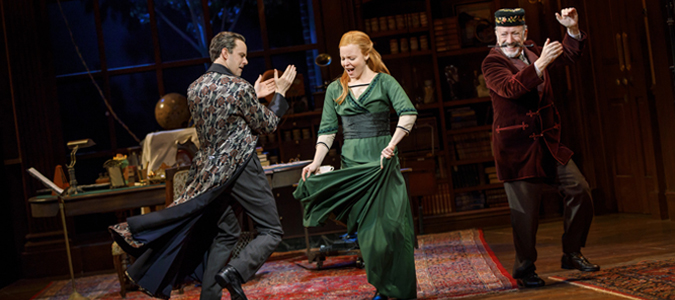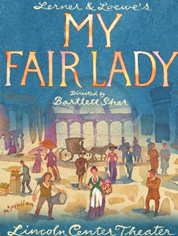

My Fair Lady
Opening Night: April 19, 2018
Closing: July 7, 2019
Theater: Vivian Beaumont
The most beloved musical of all time, Lerner & Loewe’s My Fair Lady returns to Broadway in a lavish new production from Lincoln Center Theater, the theater which brought you the Tony-winning revivals of South Pacific and The King and I. Directed by Tony winner Bartlett Sher, the stellar cast – led by Lauren Ambrose, Harry Hadden-Paton, Norbert Leo Butz, Diana Rigg, Allan Corduner, Jordan Donica, Linda Mugleston and Manu Narayan – tells the story of Eliza Doolittle, a young Cockney flower seller, and Henry Higgins, a linguistics professor who is determined to transform her into his idea of a “proper lady.” But who is really being transformed? The classic score features “I Could Have Danced All Night,” “The Rain in Spain,” “Wouldn’t It Be Loverly” and “On the Street Where You Live.” The original 1956 production won six Tony Awards including Best Musical, and was hailed by The New York Times as “one of the best musicals of the century.”
BUY TICKETSREAD THE REVIEWS:
April 19, 2018
There’s a breathtaking visual in Lincoln Center Theater’s new My Fair Lady when Lauren Ambrose emerges as Eliza Doolittle, transformed from common-as-muck flower girl to regal stunner, done up to attend the posh Embassy Ball. Costumer Catherine Zuber has wrapped her in a pale golden sheath that seems to fuse with the actress’s alabaster skin and copper-colored hair. When the servants help her into a voluminous ruby-red cloak, she looks like a dewy English rose in full bloom. Comparable delights intoxicate the eyes and ears throughout this sumptuous staging from Bartlett Sher, a director who has proved to be among the very best at chiseling surprising nuance out of vintage musicals. So why is the stately revival also a slight disappointment? Partly, it’s because of the exceedingly high bar Sher has set for himself with revelatory productions for LCT of South Pacific in 2008 and The King and I in 2015, both of them deserving Tony winners. Those midcentury Rodgers & Hammerstein warhorses, with their wonderful scores and problematic racial politics, provided fertile soil for the director to till, yielding fresh dramatic sensitivity, startling depths, and layered excavations of character and milieu.
READ THE REVIEWApril 19, 2018
Based on George Bernard Shaw’s 1913 play Pygmalion, My Fair Lady had an arduous road to fruition. Shaw had no interest in seeing it turned into a musical (and it wasn’t, until after he died), and the play lacked certain elements considered crucial to a romantic musical— including a straight-up happy ending. The fact that Alan Jay Lerner and Frederick Loewe’s show is now widely considered the most perfect musical of all time not only speaks to the brilliant storytelling and songs (“Wouldn’t It Be Loverly” and “I Could Have Danced All Night” among the gorgeous classics), but its originality and complex characters have made it forever cool. That’s not to say the 1956 show has aged flawlessly — it is compassionate toward its heroine, but not exactly enlightened on the subject of gender equality — but as a musical, and a product of its time and place, it is a masterful piece of entertainment. Without it, we might never have had Julie Andrews, who became a star as Broadway’s original Eliza Doolittle, the flower girl plucked from the streets of Covent Garden and transformed into a “proper” lady by Professor Henry Higgins. And we wouldn’t have those indelible images of Audrey Hepburn as Eliza in the lavish, Oscar-laden 1964 movie version. In the sumptuous, thrilling new revival at Lincoln Center, director Bartlett Sher (who won a Tony for the 2008 revival of South Pacific) has chosen a most surprising Eliza — Lauren Ambrose, best known as Claire Fisher on Six Feet Under. It’s not really fair to compare her to Elizas who’ve gone before, but those performances — especially Hepburn’s — are so deeply seared into our brain, most viewers can’t help but do so. Though Ambrose sings beautifully, her voice doesn’t have the power of Andrews’. And there’s no one on the planet with Hepburn’s sheer star quality (Hepburn is so enthralling she gets away with having her vocals dubbed by Marni Nixon). But Ambrose is a bold and electrifying actress, and her Eliza is more human than any Eliza we’ve seen before — a woman scarred by life but intent on finding joy. She’s frightened and erratic, but her soul is indestructible. Like the production itself, her performance is a thing of beauty.
READ THE REVIEWApril 19, 2018
Poor Eliza. It’s not enough that her own father sells her for five pounds to the bully phonetician Henry Higgins. Or that Higgins strips her of her ragged clothes and Cockney accent so she can become a refined if useless lady. No, the former flower girl is also a failure of feminism, if recent criticism is to be believed. Don’t believe it. The plush and thrilling Lincoln Center Theater revival of Lerner and Loewe’s “My Fair Lady” that opened on Thursday at the Vivian Beaumont Theater reveals Eliza Doolittle as a hero instead of a puppet — and reveals the musical, despite its provenance and male authorship, as an ur-text of the #MeToo moment. Indeed, that moment has made “My Fair Lady,” which had its Broadway premiere in 1956, better than it ever was.
READ THE REVIEWApril 19, 2018
While Carousel spins its gorgeous melodies and troublesome social politics in Midtown Manhattan, My Fair Lady, its lighter-hearted companion in the Big Book of treasured musicals toting outdated notions, has opened some 20 blocks north in a sumptuous Lincoln Center Theater production, its cast of 37 led by a tempestuous Lauren Ambrose and, in his Broadway debut, Harry Hadden-Paton, best known stateside for a Prince Charming turn on Downton Abbey but here making a right turn by going full-bore, unapologetic cad as that most arrogant of misogynists, Professor Henry Higgins. In a parity not generally associated with this tale of young female molding in old male hands, the casting of the 40-year-old Ambrose and 37-year-old Hadden-Paton (even with some age make-up) makes for something of a My Fair Lady for the #MeToo moment. Even at the start, Ambrose is no withering little flower girl, nor Hadden-Paton the old-even-when-young Rex Harrison looming over his charge. I’ve no idea how traditionalists and the nostalgically invested will take to the casting, but for me, Ambrose’s Eliza is welcome ballast, even even if Henry’s crueler bons mot still sting of patriarchy and classism – the 20th Century kind, not the Edwardian).
READ THE REVIEWApril 19, 2018
If you’ve got it, flaunt it. The splendid Beaumont stage at Lincoln Center was made for great classic musicals like Lerner and Loewe’s “My Fair Lady,” and helmer Bartlett Sher was born to stage them. This jubilant revival is meticulously mounted and entirely welcome – despite the eccentric casting choice of Lauren Ambrose as Eliza Doolittle. Ambrose, a dramatic actress noted for her style and intelligence in shows like “Awake and Sing!” and “Exit the King” (not to mention her comic flair in “Six Feet Under”), does not leap to mind as the perfect Eliza. She doesn’t even leap to mind as the okay Eliza. It’s a triumph of acting that this non-singer manages to sing like a trouper. But the strain shows. It comes as a happy shock to be reminded of what a great show this is. The Pygmalion story (lifted from George Bernard Shaw, via the Pascal film) about romantic transformation is as old and durable as a fairy tale. Henry Higgins (the ever-so handsome – and authentically British – Harry Hadden-Paton) is the magician, and Eliza, the dirty little guttersnipe he encounters selling flowers at Covent Garden, is the princess whose hidden beauty he uncovers, cultivates, and eventually falls in love with. The Ascot races and the Embassy ball are two of the trials the heroine must overcome before she can take her rightful place in society and in Higgins’ arms.
READ THE REVIEW






















